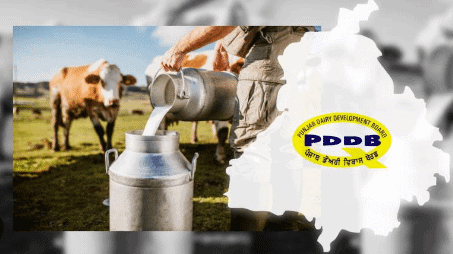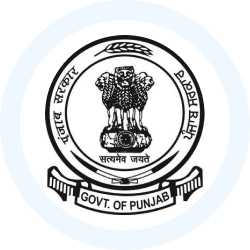Animal Husbandry in Punjab | Punjab State (PPSC) PSC: Preparation - PPSC PCS (Punjab) PDF Download
Livestock
Livestock refers to domesticated animals raised in agricultural settings for various products such as meat, eggs, milk, fur, leather, and wool. In Punjab, livestock includes cattle, buffalo, sheep, goats, pigs, donkeys, and camels. The livestock sector is crucial to Punjab's rural economy, contributing around 13% to the net state domestic product.
According to the Economic Survey 2017-18, livestock contributed 7.86% to the Gross State Value Added (GSVA) at constant prices. Punjab is the leading producer of milk in India and has the highest per capita availability of milk in the country. The sector is also a significant source of employment, providing self-employment opportunities to rural youth and disadvantaged communities.
As per the Livestock Census 2012, Punjab has a total cattle population of approximately 8.11 million, including 2.42 million cows and 5.15 million buffaloes. The state also has 0.12 million sheep and 0.32 million goats.

Initiatives by the State Government for Livestock Development
The Animal Husbandry Department of Punjab has undertaken various programs for the development of different species of livestock. The government has implemented several measures to boost the livestock sector, including:
- Advisory Boards have been established for Dairy, Piggery, Goatry, and Fishery.
- Three new veterinary polyclinics are under construction in Pathankot, Barnala, and Fazilka.
- As per the Economic Survey 2017-18, Punjab has an infrastructure of 22 polyclinics, 1367 veterinary hospitals, and 1489 veterinary dispensaries to provide better animal health services.
- Special efforts are being made for the development of sheep, pig, and poultry in the state.
- Gaushalas are being strengthened with financial assistance from the Animal Welfare Board of India (AWBI).
- A new veterinary college is being established at Rampuraphul in Bathinda district.
- A modern cattle breeding farm has been set up at village Rauni in Patiala district.
- Punjab Veterinary Vaccine Institute in Ludhiana is being upgraded according to Good Manufacturing Practice (GMP) norms.
- Government Piggery Farms in Nabha (Patiala) and Malewal (Firozpur) are being upgraded.
- New projects under the Gokul Mission have been initiated for the conservation of indigenous breeds.
- A Regional Disease Diagnostic Laboratory has been established in Jalandhar.
- Two Bull Station Semen Banks are operational in Nabha and Ropar.
- Two new pig breeding farms are being established in Hoshiarpur and Gurdaspur.
- The State Government is implementing a special scheme for Animal Husbandry Extension and Training Programme to generate employment opportunities for unemployed educated youth in rural areas.
Dairy Development in Punjab

Punjab is a major producer of milk in India, with a daily production of approximately 295 lakh litres. The state has been actively promoting dairy development through various initiatives.
- Dairy Training and Extension Centres: Punjab has 9 Dairy Training and Extension Centres that provide training and support to dairy farmers. These centres offer various dairy training courses to enhance the skills and knowledge of farmers.
- Mechanisation Incentives: Under the Rashtriya Krishi Vikas Yojana (RKVY), the state provides incentives for the purchase of Fodder Harvesters and Fodder Cutters to promote the mechanisation of dairy farming.
- Direct Marketing of Milk: To encourage direct marketing of milk, the government offers incentives for acquiring direct milk marketing units. These units include small vehicles, stainless steel milk tanks (500 litres), bulk milk coolers with diesel generators, and automatic milk dispensing systems.
- Conservation of Indigenous Breeds: The Central Government has approved a project costing 30 crore under the National Gokul Mission to conserve the indigenous Sahiwal cattle breed. As part of this initiative, a ‘Gokul Gram’ is being established at Kulle Majra.
Dairy Development Board
The Dairy Development Board was established in 1964 with the aim of ensuring profitable marketing for milk producers and overseeing the overall development of dairying in the state. The board functions in an advisory role to the administrative department and is primarily responsible for advancing the dairy sector.
Key Initiatives:
- To reduce milk production costs, the Dairy Development Board, in collaboration with the Department of Animal Husbandry, distributes high-quality fodder seeds.
- Provides training and knowledge to dairy farmers.
- Improves cattle breeds.
- Offers subsidies for the latest technological machinery.
- Sets up automatic milk dispensing units.
Milk Production Facilities:
- Milk production facilities are operational in regions such as Sangrur, Moga (the largest), and Patiala.
Cooperative Marketing:
- The Punjab State Cooperative Milk Producers Federation Limited (MILKFED) is the largest cooperative in the state, marketing its dairy products under the brand name ‘Verka’.
Poultry Development
The objective of the Poultry Development Programme is to enhance egg production in the state, given that the organised sector is already well-established. The State Government intends to boost rural backyard poultry in Punjab by offering loans on favourable terms and providing subsidies to rural residents.
The Punjab State Agricultural Board offers diversified loans to farmers for poultry development, as well as for emu and turkey farming. Government poultry farming at Malerkotla has gained special recognition for its turkey farming initiatives.
Major Veterinary Institutes and Universities in Punjab
Punjab has established several veterinary institutes and universities across the state, including:
State Veterinary Vaccine Institute:
- Founded in 1971, this institute in Ludhiana focuses on manufacturing various biological products to control contagious diseases in livestock and poultry.
State Animal Health Institute:
- Originally set up as the Sanitary Laboratory in Jalandhar during 1973-74, this institute now plays a crucial role in the advanced diagnosis of animal diseases for the entire state. It provides treatment and prevention recommendations and coordinates the activities of various diagnostic laboratories, institutions, mobile units, and render pest laboratories.
Guru Angad Dev Veterinary and Animal Sciences University
Established in 2005 in Ludhiana, this university focuses on livestock production, animal health, and disease prevention. It provides training for veterinary professionals, conducts research, and offers consultancy to livestock owners. The university is instrumental in developing skilled manpower for fisheries, poultry, piggery, artificial insemination, and dairy. Additionally, it operates referral hospitals for specialized animal treatment.
Aquaculture in Punjab
Punjab is emerging as a leading state in fish farming in India, thanks to its three perennial rivers, ponds, lakes in low-lying areas, and irrigation dams. The state is also developing its inland saline water resources. Research on fish farming in saline water is being conducted in Fazilka. Aquaculture is rapidly becoming a lucrative activity in Punjab, providing a high-quality and affordable protein source for the population. Despite having no coastline, Punjab boasts the highest fish productivity per unit area in the country. According to the Economic Survey 2017-18, the state produced approximately 85,513 tonnes of fish.
Fish Farming in Patiala District
Overview
- The Office of the District Fisheries in Patiala was set up in 1972 to promote and manage fish farming in the region.
Commercial Seed Farms:
- There are three commercial seed farms in Patiala district located at Nabha, Phagan Majra, and Patrikham.
- Phagan Majra seed farm operates under the National Seed Production Programme by the Government of India.
Fish Varieties:
- All six cultural varieties of Indian and exotic fish are bred at these farms:
- Catla
- Rohu
- Mrigal
- Grass Carp
- Silver Carp
Breeding Seasons:
- Breeding is carried out twice a year, in July-August and January-February.
Kandi Area Development:
- The Kandi area in Patiala district is rapidly developing for fisheries, indicating potential growth and investment in fish farming in this region.
Ornamental Fish Farming
Role of Guru Angad Dev Veterinary and Animal Sciences University:
- The university is actively promoting ornamental fish culture in Punjab.
- They are involved in the breeding and culture of various ornamental fish species.
Developed Species:
- The state has successfully developed the breeding and culture techniques for several ornamental fish species, including:
- Goldfish
- Comet Goldfish
- Shubunkin Goldfish
- Redhead Goldfish
- Jot Carp
- Molly Fish
- Guppy Fish
- Platy Fish
- Swordtail Fish
Market Availability:
- These ornamental fish are bred and sold regularly to hobbyists, fish sellers, and others interested in aquarium fish.
Government Initiatives for Fisheries Development
Support for Fish Farmers: The scheme provides assistance to members of existing Fish Farmers Development Agencies (FFDAs) by offering subsidies for various activities such as:
- Excavation of new fish ponds
- Renovation of old fish ponds
- Establishment of fish feed units and fish seed hatcheries
- Setting up integrated hatcheries
- Providing soil and water testing kits
- Creating breed banks for ornamental fish and conserving river fish species
Promotion of Pisciculture: The College of Fisheries at Guru Angad Dev University (GADU) is actively promoting pisciculture through integrated teaching, research, and extension programs. The college is equipped with:
- Research and teaching laboratories
- Fish farms and hatcheries for carp and catfish
Wasteland to Fish Pond Conversion: GADU is running schemes to convert wasteland in districts such as Firozpur, Muktsar Sahib, Bathinda, Faridkot, and Fazilka into fish ponds.
Wholesale Fish Markets: The government is setting up wholesale fish markets in cities like Ludhiana, Bathinda, and Amritsar to facilitate better fish distribution and sales.
Regional Research Centre:. Regional Research Centre of the Indian Council of Agricultural Research (ICAR) is being established at Jodhpur Rumana village in Bathinda to promote research in fisheries.
MOU with China:. Memorandum of Understanding (MOU) has been signed with China to promote the fisheries sector in line with the Indian government’s Blue Revolution policy.
Fishermen Welfare: The government provides various welfare measures for fishermen, including:
- Group accident insurance
- Human resource training
- Development of model fishermen villages
- Organization of workshops and seminars
- Special saving-cum-relief plans for fishermen
Famous Breeds of Animals in Punjab
Murrah Breed of Buffalo:
- The Murrah breed of buffalo is highly regarded for its exceptional milk production capabilities.
- In Punjab, this breed is predominantly found in the districts of Mansa, Bathinda, Sangrur, Patiala, Faridkot, Moga, and Amritsar.
- The Murrah buffalo is known for its strong build and high milk yield, making it the most suitable and recognized breed in the region.
Nili-Ravi Breed of Buffalo:
- The Nili-Ravi breed is another excellent milk producer, primarily found in the fertile belt between the Sutlej and Ravi rivers in Punjab.
- This breed is widespread across the state, with significant populations in districts such as Amritsar, Gurdaspur, and Firozpur.
Sahiwal Breed of Cow:
- The Sahiwal breed is the most prominent dairy cattle breed in India, originating from the arid regions of Punjab along the Indo-Pakistan border.
- These cows are known for their high milk production and adaptability to harsh conditions.
- Sahiwal cows are also found in neighboring states like Haryana, Rajasthan, and Uttar Pradesh, and they are considered the best cattle breed in the Indian subcontinent.
Beetal Breed of Goat:
- The Beetal breed of goat is known for its large size and good milk production.
- This breed is primarily found in the districts of Gurdaspur, Amritsar, and Firozpur in Punjab.
- While Beetal goats are slightly smaller than the Jamunapari breed, they are still valued for their milk yield and size.
Nali Breed of Sheep:
- The Nali breed is a hair sheep breed well-suited to the arid and semi-arid regions of Punjab, Rajasthan, and Haryana.
- Nali sheep are primarily raised for their wool and meat.
- They produce high-quality carpet wool, which is dense and heavy.
- Male Nali sheep are horned, while females are naturally hornless.
Punjab Brown Breed of Cock:
- The Punjab Brown breed is the only indigenous poultry breed in Punjab, found mainly in rural areas such as Gurdaspur.
- This breed is known for its multi-purpose capabilities, producing both good quality meat and eggs.
Bhutia Breed of Horse:
- The Bhutia breed is an indigenous horse breed in Punjab, typically found in white or grey colors.
- Due to factors such as poor nutrition and lack of organized breeding programs, Bhutia horses tend to be smaller and less robust compared to breeds from more fertile regions.
|
23 videos|50 docs|47 tests
|
FAQs on Animal Husbandry in Punjab - Punjab State (PPSC) PSC: Preparation - PPSC PCS (Punjab)
| 1. What initiatives has the Punjab State Government taken for livestock development? |  |
| 2. How is dairy development promoted in Punjab? |  |
| 3. What are the major veterinary institutes and universities in Punjab? |  |
| 4. What role does aquaculture play in Punjab's livestock sector? |  |
| 5. What are some famous breeds of animals found in Punjab? |  |
















